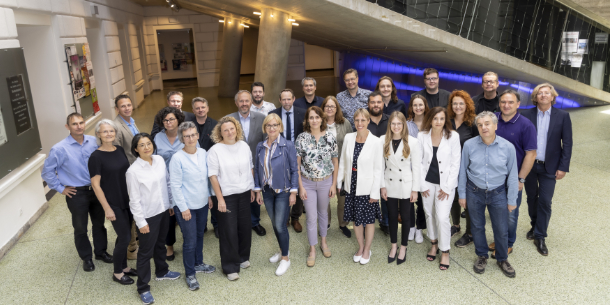- Autonomy – self-determination
- Education
- Quality assurance
A total of 26 people work in the Senate and more than 500 people work in its committees. That so many members of the university are involved shows the importance given to the respective tasks.
Interesting Details

I see the Senate as an important body for shaping the future of the university. In order to be able to meet the constantly changing framework conditions of university work, there is a need for continuous dialogue between all university members and their participation in the university's legislation, as made possible by the Senate. As one of the three governing bodies of Graz University of Technology, I also see the Senate as a partner of the Rectorate as well as a counterpart that contributes to the orientation of Graz University of Technology and critically reflects on the plans and considerations of the Rectorate.
Contact
Senate of TU Graz
Rechbauerstraße 12/I
8010 Graz
Eva-Maria SCHMIDT-HASEWEND
Senate's Office
Phone: +43 316 873 6080; 6081
e.schmidt-hasewend@tugraz.at
Senate Meetings
Academic year 2024/25
- 23 June 2025
Academic year 2025/26
- 6 October 2025
- 3 November 2025
- 1 December 2025
- 19 January 2026
- 2 March 2026
- 27 April 2026
- 18 May 2026
- 22 June 2026
According to § 3 (2) of the rules of procedure of the senate, persons affiliated with the TU Graz (employees and students) have the right to be present at the public part of the Senate sessions.
Please register at the Senate's Office if you would like to take part in the public part of a senate meeting.
Members of the Senate
- University professors: 13 members
- Mid-level staff: 6 members
This group is made up of all academic personnel who are not university professors: Extraordinary university professors, associate and assistant professors, senior scientists, assistants with and without doctorates, and university teachers. - Students: 6 members
- Administrative personnel: 1 member
Members of the Senate 2022 to 2025
1 October 2022 to 30 September 2025
Chairperson and Deputies
Chairperson:
1st Deputy:
2nd Deputy:
3rd Deputy:
Associate Professors and Academic Personnel in Research and Teaching
Administrative Personnel
Scope of Duties
Autonomy – Self-determination
- Organisation of the other two managerial bodies: members of the University Council are appointed by the Senate together with the Federal Government; the University Council appoints members of the Rectorate in a joint procedure together with the Senate.
- The Senate is the
legislative assembly
of the university. It legislates the statute of the university, which defines important regulations, such as study regulations or measures for the advancement of women, and which are constantly being adapted to the changing legal and social frame conditions.
Education
- The Senate regulates cooperation between students and teaching staff by means of relevant parts of the statute.
- The Senate has organised a TU Graz Student Ombudsperson to provide support in exceptional circumstances.
- Degrees and university certificate programmes: Working groups for particular degree programmes define and structure degrees into curricula – educational aims, qualification profiles and detailed provisions on individual courses. The two curricula committees of the Senate manage this process and then decide on the curricula. They focus on quality standards for the whole university, and on balancing the ability to study with teaching capacity and vocational training with academic education. Over the last few years, it has become increasingly important to balance our interests with those of our partners in inter-university studies.
Quality Assurance - Strategic
Quality Assurance - Operative
- The Senate’s deliberative way of working makes an important contribution to the quality of the decisions made by the Senate and its committees. Based on expertise and appraisals, the open discourse between people represented in the committees creates an environment where the best argument wins – a method that can be seen as shaping the entire scientific culture.
- The Senate sets up the Working Group for Equal Opportunitiesr, which ensures openness to diversity and mutual appreciation in all university matters.
- The Awards Committee of the Senate rewards quality everywhere where our exceptions are exceeded.
- Election of members of University Council and changes to size of University Council
- Approval of advertisement for the position of Rector and the creation of a shortlist of three candidates for the election of a Rector.
- Statement on suggestions for Rector regarding Vice Rectors: Number, working hours, proposal of candidate
- Involvement in dismissing members of University Council, the Rector and Vice Rectors
- Statement before people are allocated to individual organisational units
- Establishing a Working Group for Equal Opportunities
- Nomination of a female and male main member and deputy member for the Arbitration Board
- Adoption and changing the Statute on the suggestion of the Rectorate.
- Adoption and changing of the curricula for full degree programmes and university certificate programmes.
- Approval of the draft of the development plan (complete strategy for TU Graz) created by the Rectorate as well as the draft of the organisational chart, which describes organisational units and their tasks.
- Involvement in habilitation procedures (in German: Habilitationsverfahren) and appointment procedures
- Determination of academic degrees and titles for graduates of university certificate programmes
- Appraisals at complaint procedures on study matters
- Appointment of collegiate bodies, such as habilitation committees, appointment committees and curricula committees as well as adoption of directives for their tasks.
Bases
University Act
Rules of Procedure of the Senate
Statute of TU Graz
Directives
The following directives of TU Graz are decided upon by the Senate:
- Directive for Appointment Procedure: Richtlinie für das Berufungsverfahren
- Directive for habilitation procedure: Richtlinie für das Habilitationsverfahren
Committees
- Curricula Committee of the Senate for Bachelor’s and Master’s Degree Programmes
- Curricula Committee of the Senate for Doctoral Programmes and Certificate Programmes
- Work Groups for Study Committees
- Appointment Committee according to § 25 (8) 2 University Act
- Habilitation Committee according to § 25 (8) 1 University Act
Degrees and University Certificate Programmes
For Bachelor’s and Master’s Degree Programmes
- Checklist for submitting curriculae: Checkliste für das Einreichen von Studienplänen
- Example curricula for TU Graz bachelor’s degree programmes: Mustercurriculum TU Graz Bachelorstudien
- Example curricula for NAWI Graz bachelor’s degree programmes: Mustercurriculum NAWI Graz Bachelorstudien
- Example curricula for TU Graz master’s degree programmes: Mustercurriculum TU Graz Masterstudien
- Example curricula for NAWI Graz master’s degree programmes: Mustercurriculum NAWI Graz Masterstudien
- Directives for English language master’s programmes for strengthening internationalisation: Richtlinien für englischsprachige Masterstudien zur Stärkung der Internationalisierung
For Doctoral Programmes
- To Curricula for Doctoral Programmes
- You can find the Statutes for the Doctoral Schools on the page of each Doctoral School.
For University Programmes, Courses and Seminars
In German:
Cooperation in Austria
Conference of Senate Chairpersons at Austrian Universities (SVK)
This is attended by chairpersons of senates and their deputies from public universities in Austria. For the functional period 2019 to 2022, the Senate Chair of Graz University of Technology Gernot Kubin was elected as spokesperson; from 2016 to 2019 he was a member of the team of spokespersons.
The press releases and statements by the Conference of Senate Chairpersons at Austrian Universities can be found on the German page.

